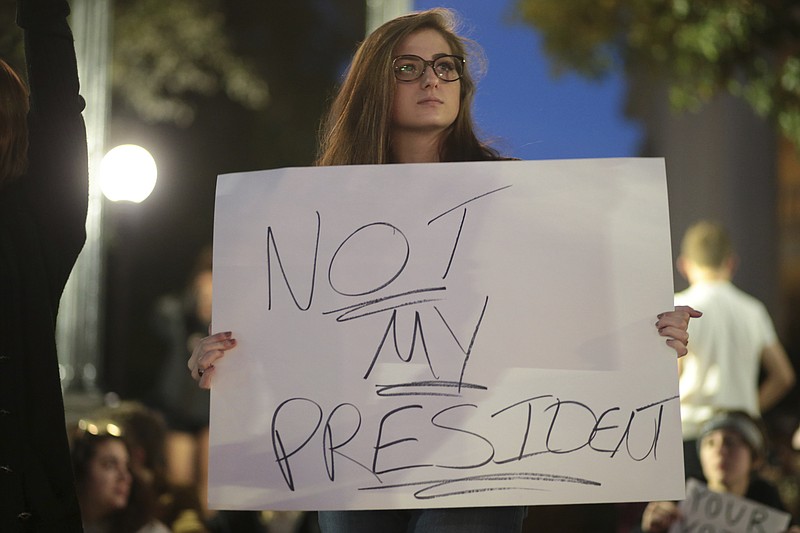Well, as the anecdotal politician declared after his re-election defeat: "The people have spoken. Damn them."
The fictional comment is intended to be humorous - OK, mildly so - but the results of Tuesday's election once again remind us of the historically valuable way in which the nation's leadership passes from one person to another.
On Wednesday, Democrats found themselves afflicted with the political equivalent of the seven stages of grief: shock or disbelief, denial, bargaining, guilt, anger, depression, and acceptance or hope. Republicans have experienced the same grievousness in their own presidential elections, so they can empathize with Democrats. Realists in both parties know this is a recurring phenomenon.
The riotous demonstrations by young people incensed by Hillary Clinton's loss on Tuesday suggests it may take them longer to reach the seventh stage and begin planning for the next presidential campaign four years hence. (Those carrying signs proclaiming that Donald Trump is "Not My President" suggested a curious mixture of anger and ignorance, not to mention a rejection of political reality.)
Even so, it does not follow that "all is lost, so let's move to another country and await the end of Trump's administration." Obviously, Democrats were devastated by their loss last week, and they are wary of what the Trump presidency portends. And even as Republicans celebrate the peaceful quadrennial transfer of power, it is safe to assume that many of them share that wariness.
This was one of the most contentious presidential elections in American history, and all the more remarkable for the breadth of Trump's victory. But it wasn't just the Democrats who were left reeling by the outcome. Those in the usual election apparatus - pollsters, campaign managers, political analysts, et al - suddenly found themselves to be collateral damage. They employed the usual tools and methods for predicting the outcome, just as they had in previous campaigns. Their unspoken rationale: What could go wrong?
A lot, actually.
Polling "experts" who were predicting an 88 percent likelihood of Clinton's victory are belatedly coming to the conclusion that for all their relevant expertise, they were blindsided by the undetected evidence that there were a lot of "hidden voters" for Trump after all. Many of those polled, it now seems obvious, apparently weren't totally honest in their responses to pollsters and others. Maybe they did not want to admit their Trump preference. Obviously, despite the repulsiveness of his scattershot insults of women and minorities (especially Mexicans and Muslims), and the disclosures of his less-than-honorable business practices, they were willing to take a chance on this political newcomer.
Could the actual attitudes of so many Americans have been discerned by more rigorous polling? Probably not. But if those in the industry don't retool their methodology, we could see a recurrence of pre-vote uncertainty in 2020 (and maybe even the 2018 congressional campaigns).
In their 90-minute White House meeting on Wednesday, Trump and President Obama displayed mutual cordiality that occurs every four years when the incumbent president cedes power to his successor.
It was remarkable, however, given their respectively harsh criticisms. Trump denounced Obama's presidency and him personally, and only late in the campaign grudgingly abandoned the birther idiocy he promoted before becoming a candidate. Obama was no slouch either, especially in the frequency in which he asserted that Trump was unqualified to be president.
Now, America is preparing for a new president - an untested one, just like his predecessors. But like it or not, our hope for Trump's presidency is the same one accorded those who claimed the office in years past. He has been entrusted with the grave responsibility to serve the American people honestly - to the best of his ability, as the oath of office states. We have no choice but to hope his administration will ensure America's security and prosperity in a dangerous world.
Michael Loftin is former editorial page editor of The Chattanooga Times.

